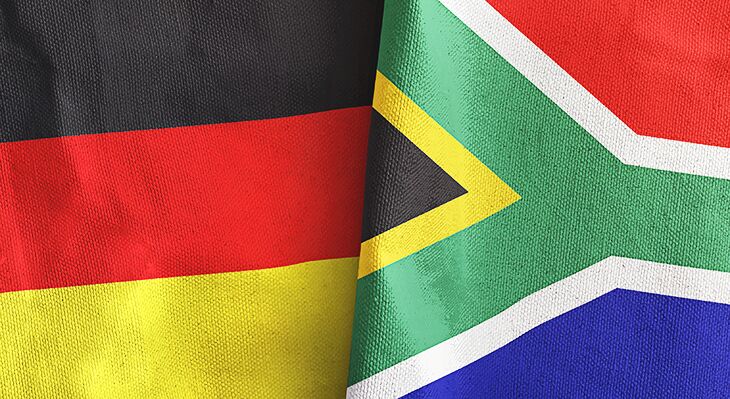Successful VET cooperation between Germany and South Africa
Germany and South Africa are strengthening their cooperation in vocational education and training. The focus is on the development of lecturers and curricula, on innovative approaches to the green economy, and on close links between stakeholders.

Robust vocational education and training requires excellent teaching staff and is based on curricula which respond to the needs of the world of work. For this reason, the particular focus of the cooperation between Germany and South Africa in 2024 was the development of lecturers and curricula.
To support this, both countries had agreed to cooperation in the form of a bilateral group of experts, which GOVET is coordinating from the German side on behalf of the German Federal Ministry of Education and Research (BMBF). Following a virtual workshop in March, the three German experts – Prof. Michael Gessler (Institute for Technology and Education at the University of Bremen), Prof. Waldemar (Erfurt University) and Michael Härtel (Head of the Teaching and Learning, VET Staff division at BIBB) – travelled to Irene near Pretoria for a face-to-face workshop. This took place from 13 to 16 May 2024. The South African partners entered into professional dialogue with a broad group of participants including vocational school representatives, the qualification authorities, a number of sector education and training authorities (SETAs) as well as teacher training universities. Quality requirements for employers providing training, the continued development of teaching in the context of the digital transformation, and staff support in the development and implementation of modern teaching and learning standards were all among the topics discussed Another main topic was university teacher training and in particular the integration of work-based learning into the training and the emphasis on process-oriented VET focussed on employability skills. Several bilateral exchanges with interested partners took place following the workshop, for example with the Qualification Council for Trades and Occupations and a number of SETAs. Future priorities were more clearly outlined as a result of the workshop, for example follow-up activities on network development between teacher training institutions were prepared.
The topic of sustainability within vocational education and training also occupies an important position within the bilateral cooperation. Based on workshops and dialogue from the previous year, GOVET’s publication entitled Sustainability in Vocational Education and Training – National and International Experiences included three articles contributed by authors from South Africa and a further two from authors in the southern Africa region. The articles show the extent of the challenges involved in achieving a socially and economically-balanced transformation in South Africa – and, at the same time, how reflection on the subject and approaches to solutions in the region might also provide inspiration for Germany and Europe. Alongside the workshop in Irene, potential synergies with the South African Department of Science and Innovation (DSI) relating to the green hydrogen economy were discussed. The competencies needed to support the industrial use of green hydrogen were also the subject of an international panel discussion at the University of the Witwatersrand in Johannesburg. The two German experts were involved in the panel together with specialists from South Africa and India. Both sides are very interested in cooperation in the area of vocational education and training research. Planning for a potential joint conference was also discussed during the stay in May 2024.
Germany has accompanied the social transformation of democratic South Africa since its inception. Equal opportunities and quality education are among the key issues of cooperation. The focus is on both individual prospects and economic development.
Dr. Ralf Hermann, Head of GOVET
Networks are important for ensuring successful cooperation across continents. In order to strengthen relationships at a local level, GOVET organised a number of meetings with German and South African cooperation partners in the country. The meeting with Simone Pohl, the new CEO of the German South African Chamber of Commerce and Industry, continued the long-standing exchange with the chamber. The exchange with the Centre for Researching Education and Labour at the University of the Witwatersrand in Johannesburg (Wits REAL) was similarly continued. This also involved providing valuable contacts for the BMBF's funding and cooperation instruments which the project administration agency, DLR Projektträger, is implementing on behalf of the ministry.
At the invitation of the German Embassy, GOVET provided information in Pretoria on the current status of bilateral cooperation and on the opportunities for support in developing vocational courses at German schools abroad in South Africa. GOVET was consulted about this on a number of occasions and about establishing vocational courses in South African secondary schools. These approaches for consultation were made by the German mission abroad, the German schools themselves and by the Department of Basic Education in South Africa. As a central office with obligations to all departments, in 2024 GOVET finally provided a comprehensive response to questions from the German Federal Ministry of Labour and Social Affairs (BMAS) relating to the potential offered by South Africa with regard to skilled worker recruitment.
The German-South African Binational Commission defines and decides on high-priority issues with regard to relations between the two countries. The joint working group on labour, social affairs and vocational training, in which a number of German government departments are involved, determines the cooperation priorities in these areas. Cooperation in the area of lecturer and curricular development in particular was agreed. GOVET play a significant role in helping shape the vocational education and training cooperation of the Federal Ministry of Education and Research (BMBF). At the end of June 2023, the BMBF’s joint declaration of intent was extended with the training ministry. It forms the basis of GOVET's cooperation with South African partners.